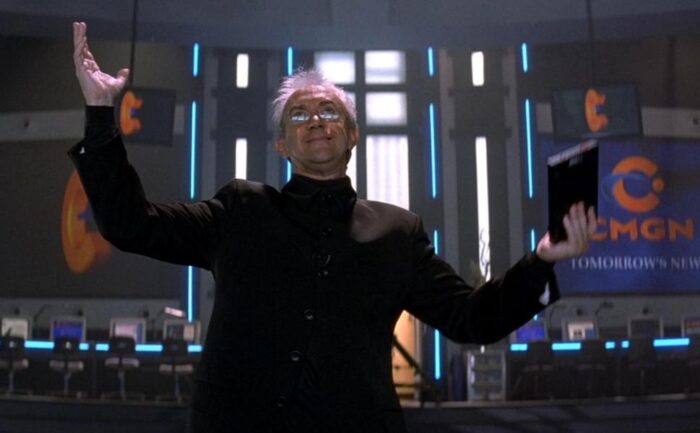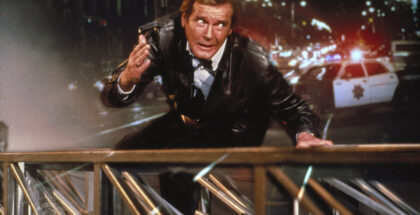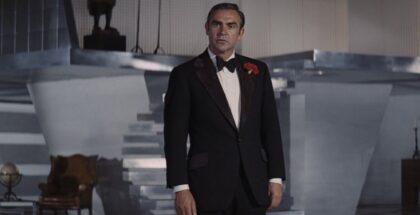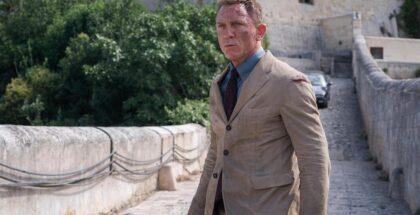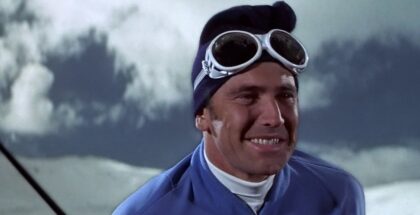Tomorrow Never Dies: 007 does satire in this timely romp
Review Overview
Satire
8Spectacle
8Jonathan Pryce
8David Farnor | On 24, Sep 2021
One of the fun things about the James Bond franchise is the way that each film serves as a time capsule, reflecting pop culture trends, political shifts and wider social attitudes at the point at which 007’s martini has been shaken. That means a large number of the earlier Bond films – well, anything pre-Timothy Dalton – have dated poorly and work as fun romps with the caveat that they come from a time when sexism had made little progress from Bond’s own misogynistic values. Tomorrow Never Dies, made in 1997, marks one of the rare times in which the 007 franchise knowingly tips its hat to current events, emerging as 20th-century satire as much as an action blockbuster.
The villain this time round? Elliot Carver, a media mogul who is trying to drum up a war between the UK and China to topple the Chinese government and rake in the profits from having the exclusive broadcasting rights to the carnage. It’s a frankly ridiculous premise, but it’s one torn straight from the front pages of the real world: the overblown take on one man’s ego and commercial ambition is inspired by Robert Maxwell.
And so our ruthless tycoon here works with all kinds of dodgy people to achieve his goals – including “techno terrorist” Henry Gupta – regularly blackmails people with secret recordings, releases his own branded software that’s full of bugs so people are forced to upgrade every year, and otherwise swans about with a proto-iPad saying things like: “There’s no news like bad news!” In 1986, Maxwell even secured the rights to publish China’s official newspaper, China Daily, in Europe – and, in 1998, went on to respond to the Chinese government’s crackdown upon protestors by suspending the publication.
The film was released at a time when another RM was also sinking his claws into the media landscape: Rupert Murdoch. In 1997, his flagship tabloid The Sun was on 10 million readers a day, and while that kind of topicality might leave another blockbuster feeling dated, the events that have occurred since 1997 only reinforce the idea that Tomorrow Never Dies really wasn’t all that far-fetched after all.
Unfortunately, the film doesn’t have the dialogue to back it up, with some of the worst speeches and exchanges since Diamonds Are Forever. Fortunately, though, much of the dialogue is delivered by the inimitable Jonathan Pryce, which means that it’s hugely entertaining anyway.
Hammier than Jon Hamm eating a ham sandwich, Pryce chomps his way through the scenery with just the right balance between camp and cruel – his smiling deadpan is a delight to see in action, capable of being nasty but also amusing petulant and pathetic.
He’s surrounded by some increasingly absurd sidekicks, from a German torture specialist to a sadistic henchman who lives on a stealth boat, but he’s facing off against Brosnan, who’s at his best here, having settled into 007’s tux pos-GoldenEye, and the superb Michelle Yeoh as an operative also investigating Carver’s corrupt methods. Even Teri Hatcher’s appearance as an old flame again builds on GoldenEye’s knack for digging under Bond’s skin just enough to avoid being two-dimensional.
Director Roger Spottiswoode, meanwhile, gives everyone some stellar set pieces to run through, including two of the franchise’s best vehicle sequences – not just a motorbike chase that includes a helicopter jump but also a remote-control car showdown in a car park that sells the idea of Bond driving a BMW instead of an Aston Martin. Throw in a punch-up at Harmsworth Quays Printing in London’s Docklands (now owned by the Daily Mail) and a soundtrack by the phenomenal David Arnold (bringing John Barry’s symphonic style into electro-tinged modernity), and you have a Bond film that’s pure Roger Moore, but works better than almost all of Roger Moore’s outings.


